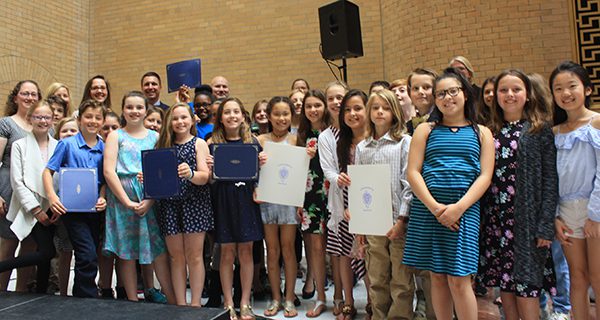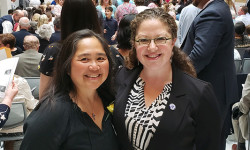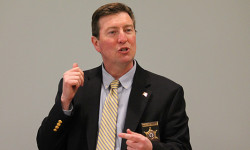[ccfic caption-text format="plaintext"]
Fourth grade students of Bates and Fiske Elementary Schools, led by teachers Irene Gruenfeld and Anne Gayner, have been recognized for their project, "Solving Erosion at Morses Pond."
At a State House ceremony, Energy and Environmental Affairs (EEA) Secretary Matthew Beaton honored 32 energy and environmental education programs at Massachusetts schools and nonprofits as part of the 24th Annual Secretary’s Awards for Excellence in Energy and Environmental Education.
“The environmental programs and educators honored today provide hands-on learning opportunities in STEM fields that prepare their students for success,” said Governor Charlie Baker. “Our administration is proud to recognize the dedicated Massachusetts teachers and nonprofit educators who go above and beyond what is required to get their students interested in studying energy and the environment.”
“Environmental and energy education programs teach our children important scientific and critical-thinking skills, as well as show them how they can make a difference in their communities and schools,” said Lieutenant Governor Karyn Polito. “These extraordinary educators are proactively preparing their students to be our future environmental stewards.”
Winners competed for $5,000 in awards, funded by the Massachusetts Environmental Trust with the intention to fund further environmental education initiatives at the schools. EEA solicited Excellence in Energy and Environmental Education Award nominations in early 2017. Schools and organizations that voluntarily incorporate environmental education into public or private school curricula are given priority.
“The initiatives we are recognizing today range from garden projects and outdoor classroom programs, to watershed and vernal pool projects, to teaching about the environment through art and music,” said Energy and Environmental Affairs Secretary Beaton. “As we face many ongoing environmental challenges, including a changing climate, it is more important than ever that we prioritize environmental literacy and teach the next generation the importance of protecting our natural resources.”
The project applications were scored by the Secretary’s Advisory Group on Energy and Environmental Education, a group of environmental educators from state agencies, non-profits, industry and academia.

























